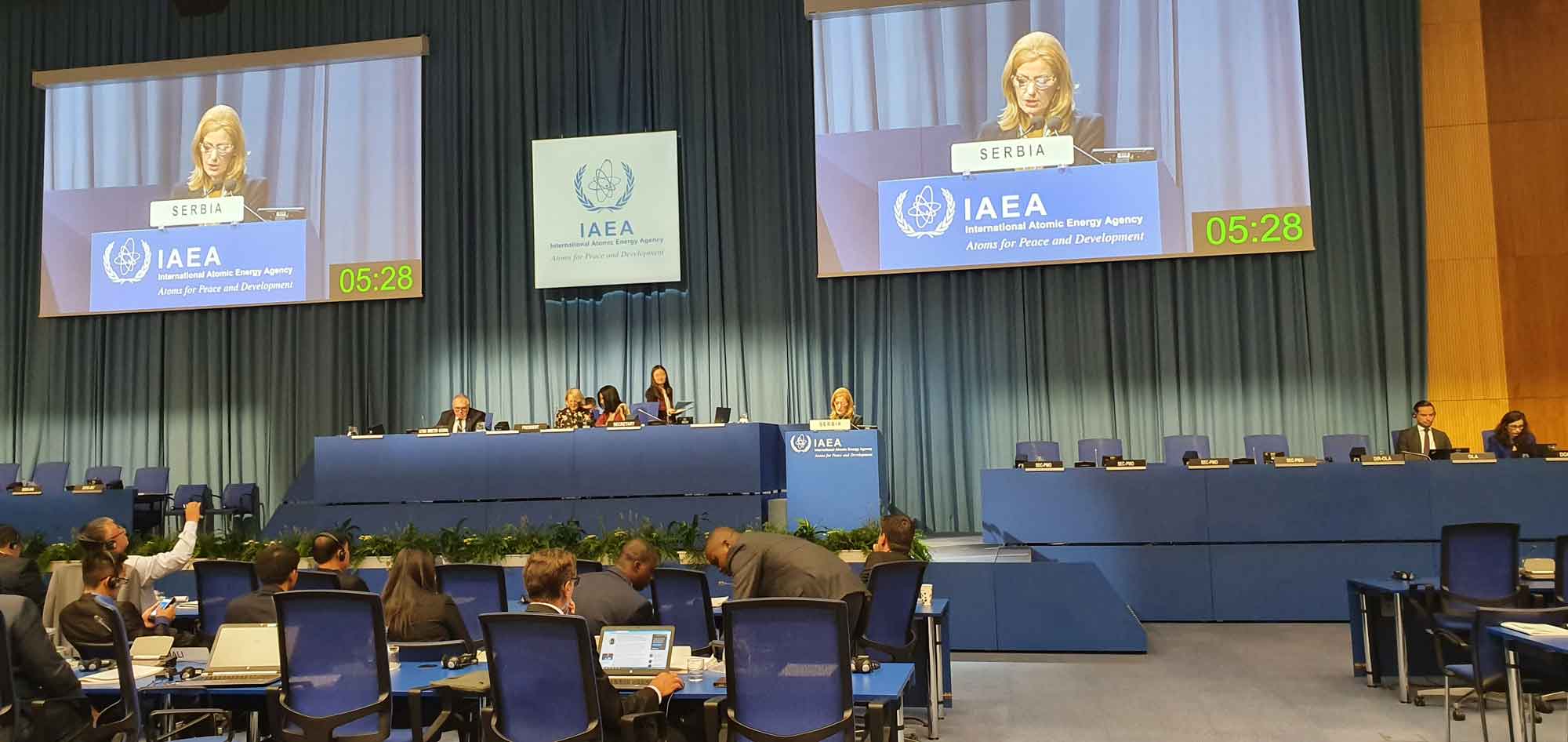On behalf of the delegation of the Republic of Serbia, Roksanda Ninčić, Head of the Permanent Mission at the Organization for Security and Co-operation in Europe (OSCE) and other international organizations in Vienna, gave a speech today at the IAEA’s 63rd General Conference. At the very beginning, she expressed regret and paid tribute to the recently deceased Director General of the IAEA, Mr Yukiya Amano, and emphasised that the Republic of Serbia greatly honours all the results of the IAEA under his leadership.
‘His outstanding professionalism and commitment, inspired us to equal him in contributing to further strengthening of the IAEA reputation’, said Roksanda Nincic.
Ms. Nincic reminded the attendees that the Republic of Serbia fully aligns with the Statement of the European Union, and stressed the global importance of the IAEA’s efforts, as well as the significance our country attributes to the cooperation with this eminent institution.
By reaffirming our unambiguous, permanent and solid commitment to the fundamental principles and goals of the IAEA in terms of safe and secure use of nuclear energy for peaceful purposes, she said:
‘Our country will continue to support all IAEA efforts to strengthen and upgrade the efficient implementation of Safeguards, in compliance with the Treaty on the Non-Proliferation of Nuclear Weapons. During the past year, Serbia has submitted to the IAEA the initial declaration on the Protocol Additional to the Agreement for the Application of Safeguards in connection with the Treaty on the Non-Proliferation of Nuclear Weapons, thereby fulfilling all obligations in this regard. This confirms our commitment to combating all threats arising from nuclear terrorism. Serbia will also continue to emphasize the importance of nuclear safety and security of radioactive sources, and contribute to global efforts aimed at reinforcing the efficient mechanisms of combating the illicit trade of nuclear material and other radiation sources by improving their physical protection and by putting orphan sources under control.’
Roksanda Nincic pledged that our country would continue to support all IAEA’s programmes and efforts in developing and strengthening efficient application of Safeguards in connection with the Treaty on the Non-Proliferation of Nuclear Weapons, and to develop its national legal and regulatory framework in the field of radiation and nuclear safety and security in line with the international standards and EU regulations.
Roksanda Nincic was pleased to point out that the new Law on Radiation and Nuclear Safety and Security entered into force in the Republic of Serbia in December 2018. The new law provides for a higher level of protection for a member of the public and the public from the harmful effects of ionizing radiation. The new law also ensures better environmental protection, as well as the improvement of the environment, production, trade and transport of radioactive material, and radiation protection in the Republic of Serbia in general. She also said that the new law ensured assumptions for further harmonization of national legislation with the EU regulations in line with all relevant conventions concluded under the auspices of the IAEA.
‘The new law also provided for the establishment of Serbian Radiation and Nuclear Safety and Security Directorate as an independent and separate regulatory body with stable finances and sufficient expert and administrative capacities, which, for the first time, encompasses all regulatory functions in the area of radiation and nuclear safety and security, including inspection oversight’, said Ms Roksanda Nincic.
She took this opportunity to thank the IAEA Office of Legal Affairs for a high-quality contribution in drafting the text of the Law.
‘The Republic of Serbia will continue to apply the Code of Conduct on the Safety and Security of Radioactive Sources and the Guidance on the Import and Export of Radioactive Sources for their exceptional contribution to furthering the safety and security of radiation sources’, added Roksanda Nincic.
She also stressed the importance the Republic of Serbia attaches to the technical assistance our country receives from the IAEA, ‘this type of assistance is of great and fundamental significance in terms of achieving a higher level of nuclear safety and security, meeting the IAEA’s requirements and standards towards the better control and use of nuclear energy, as well as the sustainable development of our society as a whole. I would like particularly to underline the continuous support our country received in enhancing legislative and legal framework, functions of regulatory body, further activities regarding safe radioactive waste management and related activities, as well as the activities in connection with the public health. In this regard, I would also like to point out that there are currently activities in several national, regional and international projects. Although the Republic of Serbia primarily receives assistance from the IAEA through Technical Cooperation Programme (TCP) for developing human resources in numerous workshops and training courses, expert and study visits, capacity building by procuring medical and diagnostics or therapeutic, or control and measurement equipment, there is also an evident upward trend in terms of an increasing number of experts or institutions from the Republic of Serbia going on expert missions to other countries on account of their undisputed expertise, or acting as hosts to the international study or expert visits. In addition, the number of IAEA TC international meetings the Republic of Serbia hosts, is also rising.’
She pointed out that the Republic of Serbia fully supports the IAEA Annual Report for 2018, as well as the programmes and the budget for 2020. She also promised that the Republic of Serbia is to consistently support and align with the activities of the IAEA and the Secretariat, and to remain committed to the IAEA’s fundamental principles and goals towards the safe and secure use of nuclear energy.

